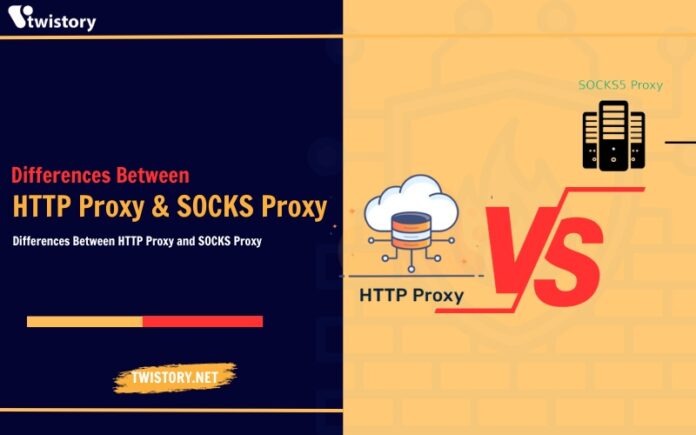If you want to use a proxy, you need to know the differences between HTTP Proxy and SOCKS Proxy. These are two types of proxies that have different features and functions. By learning how they work and what they offer, you can choose the best proxy type and provider for your needs.
This article will explain what SOCKS and HTTP proxies are, how they handle data, and what advantages they have. We will also compare and contrast SOCKS and HTTP proxies, and show you how they differ from each other. Moreover, you can find out more about SSL proxies, which are another type of proxy.
What is an HTTP Proxy?
HTTP is the basic protocol that enables data transfer on the internet. It is a text-based protocol that does not keep a connection between the sender and the receiver. It can fetch different types of resources, such as HTML, CSS, or other scripts, from web servers to web browsers.
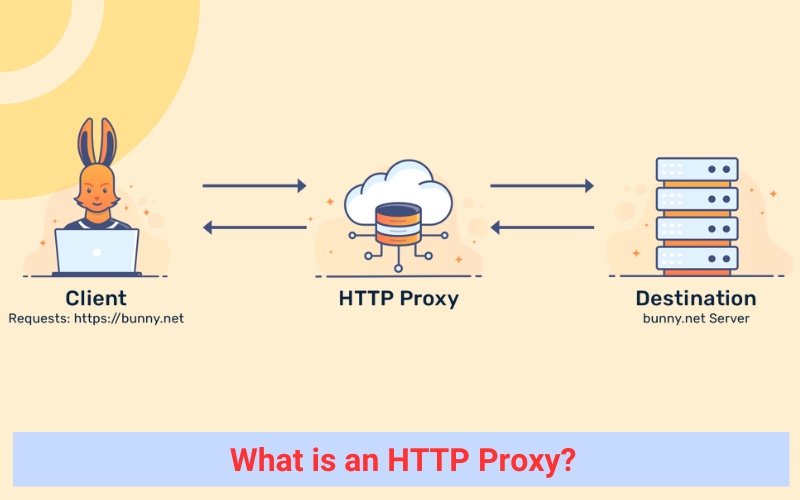
HTTP works by following a client-server model, where the client (usually a web browser) asks for some data from the server, such as a web page, an image, or a video. The server responds by sending the data back to the client. After that, the connection is closed. This means that each request needs a new connection.
An HTTP proxy is a type of proxy that is designed for HTTP connections. It follows the same client-server model as HTTP. It also acts as a middleman between the server and the client (web browser) by forwarding requests and sending back data in HTTP format. An HTTP proxy can help the client access blocked or restricted websites, hide its IP address, or improve its performance.
What is a SOCKS Proxy?
SOCKS is a type of internet protocol that is used for tasks that require a lot of bandwidth, such as streaming content or sharing files. SOCKS uses a TCP connection, which is a protocol that ensures reliable and accurate data transfer over the internet.
When using SOCKS proxies, the data is sent through a proxy server that acts as a middleman between the client and the destination. SOCKS proxies can hide the client’s IP address and help them access websites that are blocked or restricted by location.
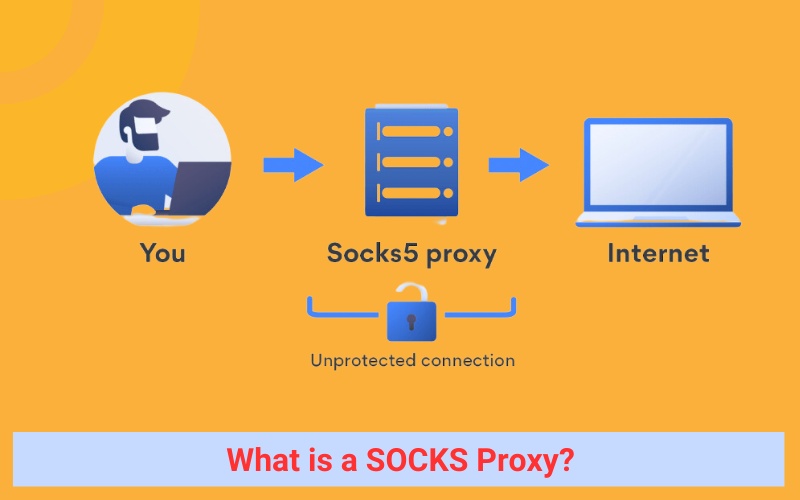
Unlike HTTP, SOCKS does not understand web data. However, they are useful for communicating with websites that have a firewall and do not allow regular clients to connect. The main advantage of SOCKS proxies is that they can work with any network protocol and any port number.
>> See More: SOCKS5 Proxies: Where to Buy and Why They Matter
Comparison Between SOCKS4, SOCKS5, and HTTP
SOCKS4 and SOCKS5 are two versions of a proxy protocol that can handle different types of data. SOCKS4 is an older version that only has basic proxy features and does not support authentication or UDP. SOCKS5 is a newer version that has more security and authentication options. SOCKS5 can also work with TCP, UDP, and IPv6.
HTTP is another proxy protocol that is mainly used for web data. HTTP proxies are easy to set up and compatible with most web browsers, but they may not work well with other types of data. SOCKS5 is usually a better choice when you need more features and flexibility for different protocols, while HTTP is good for web surfing.
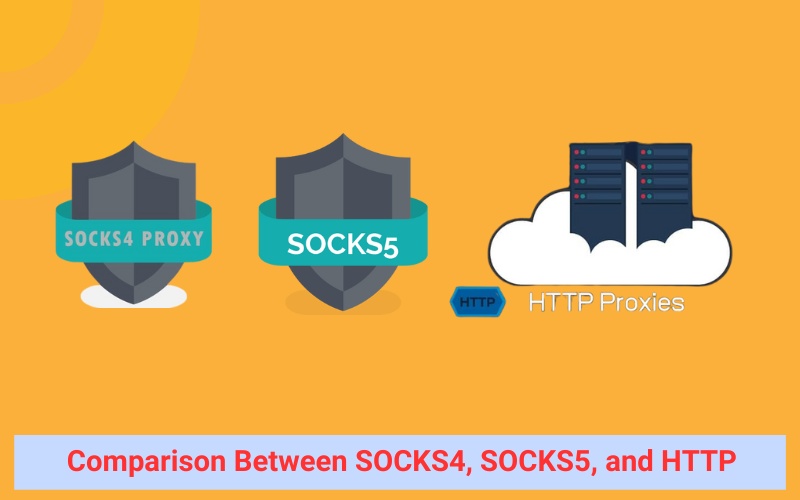
Benefits of Using Both HTTP Proxy and SOCKS Proxy
We will explain why SOCKS or HTTP proxies are beneficial for your business. You can use them for various purposes and scenarios. The HTTP proxy’s server settings can be customized to fit your needs.
Advantages of HTTP Proxies
HTTP proxies can understand web data and manipulate it. This means that you can use an HTTP proxy to filter or cache web data. This way, you can get only the data you need from websites and avoid wasting time and resources.
HTTP proxies also provide extra security for your server. They can detect and block harmful data packets, such as spyware or corrupted content, that try to enter your server.
HTTP proxies can also help you improve your web scraping results. You can use them to change your HTTP request headers. This can help you access websites that are blocked or limited by location.
SOCKS proxies can work with any type of data and any protocol or port. This makes them very versatile and adaptable. You can use them for many applications and scenarios that require high bandwidth or low latency.
Benefits of SOCKS5 Proxies
Firewalls are systems that block or allow data packets based on some rules. Sometimes, firewalls can prevent clients from connecting to servers that are outside their network. This is where SOCKS proxies can help. They can create TCP connections between the client and the server, bypassing the firewall. (This can also work for HTTP proxies, but only for HTTP connections.)
Protocols are rules that define how data is transferred over the internet. There are different types of protocols, such as HTTP, TCP, UDP, and IPv6. SOCKS proxies can work with any protocol and any port number. This makes them very flexible and versatile. For example, SOCKS5 proxies can use UDP, which is a protocol that sends data quickly and efficiently.
Differences Between SOCKS and HTTP Proxies
Depending on what you want to achieve and what you need, you should choose the most suitable proxy type. You can use different protocols to integrate our proxies and change them as you wish. HTTP(S) and SOCKS5 are supported by Residential and Mobile Proxies, while Dedicated Datacenter Proxies can connect through HTTP and SOCKS5. Knowing the features of both proxy types, we can compare and contrast them.
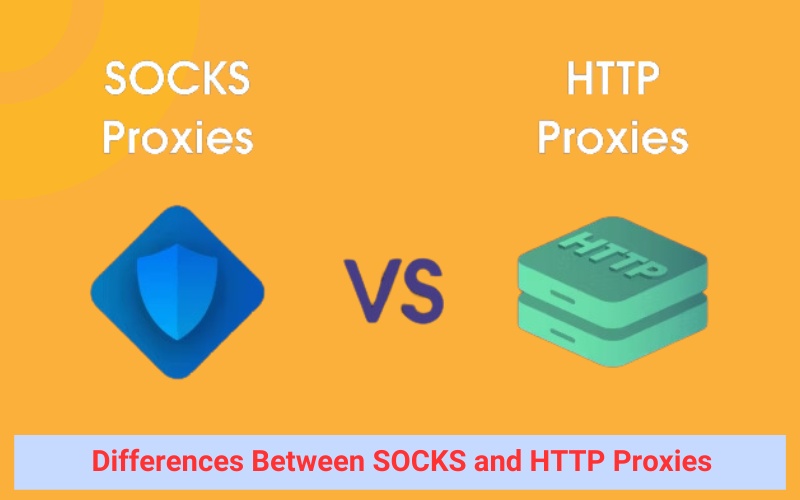
Security Levels
Privacy and security are important reasons for using a proxy. HTTP and SOCKS proxies help you hide your online actions by connecting you to a server through another one.
HTTP proxies are good for protecting emails and doing cybersecurity projects because they can read and filter data packets based on your needs. You can also use them for web scraping and data mining.
Main Functions
HTTP proxies can only deal with HTTP(S) traffic, but they can be adjusted for different purposes. They can read and filter the data that goes between a client and a web server, and they can detect duplicate requests or store responses.
SOCKS proxies are not limited by any network protocols, so they can be used for more situations. They cannot understand the data that they transfer, so they are ideal for reaching connections that are blocked by a firewall.
Performance Evaluation
If you care a lot about speed, we recommend choosing private proxies for any proxy type. HTTP proxies can filter data or store web pages, which helps your scraping activities and improves load speeds and performance. You can handle more requests per second with these proxies.
SOCKS proxies are also fast and easy to use, which makes them suitable for downloading, transferring, and uploading web data online.
Conclusion
HTTP Proxy and SOCKS Proxy are not competitors, but different options for different purposes and needs. You can use SOCKS for projects that need to download and transfer a lot of data. HTTP proxies are good for filtering data for security or performance reasons. If you are not sure, HTTP proxies should work well for you if your target is HTTP(S). If you want to learn more about interesting and useful topics, you should follow Twistory.

